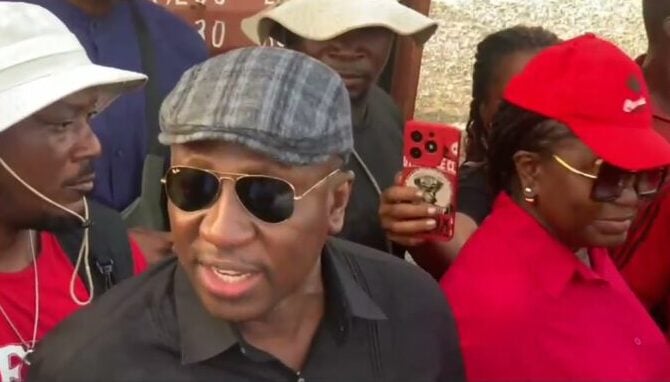The suspension of Chief Justice Gertrude Torkornoo by President John Dramani Mahama has ignited a firestorm of political controversy in Ghana, prompting accusations of executive overreach and concerns about the erosion of judicial independence. Minority Leader Alexander Afenyo-Markin, speaking during a New Patriotic Party (NPP) demonstration against the suspension, issued a fervent plea for unity across party lines to safeguard Ghana’s democratic principles. He characterized the situation as a siege on the nation’s foundational values, emphasizing that the defense of the rule of law and the judiciary’s autonomy transcended partisan politics. The protest culminated in the submission of a petition to Parliament, received by Clerk Ebenezer Ahumah Djietror, signifying the escalation of the conflict to the legislative arena.
Afenyo-Markin’s address underscored the gravity of the situation, highlighting the perceived threat to the judiciary’s independence. He warned against the increasing politicization of this vital institution, urging Parliament to act as a bulwark against any potential excesses by the executive branch. He argued that while accountability is crucial, it should not be used as a pretext to undermine the integrity of state institutions. The Minority Leader’s call to action placed Parliament at the center of the unfolding crisis, emphasizing its constitutional duty to protect the delicate balance of power and uphold democratic principles. He framed the legislature as the ultimate defender of Ghana’s democracy, urging members to rise above partisan considerations and act decisively in the face of this perceived threat.
The suspension of Chief Justice Torkornoo has exposed deep fissures within Ghana’s political landscape, with various stakeholders engaging in a heated debate about its implications. The core issue revolves around the separation of powers and the potential for executive overreach. Afenyo-Markin’s appeal for unity reflects the concern that partisan divisions could further exacerbate the situation and undermine the stability of the nation’s democratic institutions. The NPP’s demonstration and subsequent petition to Parliament signal their intent to challenge the President’s decision and seek legislative intervention.
The clash between the executive and judicial branches raises fundamental questions about the functioning of Ghana’s democracy. The independence of the judiciary is a cornerstone of any democratic system, ensuring impartiality and the protection of fundamental rights. The President’s action has sparked fears that this vital principle is being compromised. Critics argue that the suspension sets a dangerous precedent, potentially opening the door for future interference in judicial matters. The ensuing political polarization could have long-lasting consequences, eroding public trust in institutions and hindering the effective governance of the country.
Afenyo-Markin’s call for parliamentary intervention underscores the critical role of the legislature in upholding the principles of checks and balances. Parliament is tasked with scrutinizing executive actions and ensuring that they conform to constitutional norms. The petition presented by the NPP will likely force Parliament to address the issue head-on, demanding a thorough examination of the circumstances surrounding the Chief Justice’s suspension. The outcome of this parliamentary process will have significant implications for the future of Ghana’s democracy, either reaffirming the independence of the judiciary or potentially legitimizing executive overreach.
The unfolding events in Ghana highlight the fragility of democratic institutions and the importance of vigilance in safeguarding them. The controversy surrounding the Chief Justice’s suspension has become a flashpoint for broader concerns about the balance of power and the future of Ghana’s democracy. The response of Parliament to the NPP’s petition will be a crucial test of its commitment to upholding its constitutional responsibilities and defending the independence of the judiciary. The outcome of this political standoff will significantly impact the nation’s democratic trajectory, shaping the relationship between the executive, legislative, and judicial branches for years to come. The call for unity amidst this political turmoil underscores the urgent need for a national dialogue to address the underlying tensions and reaffirm the shared commitment to democratic principles.


